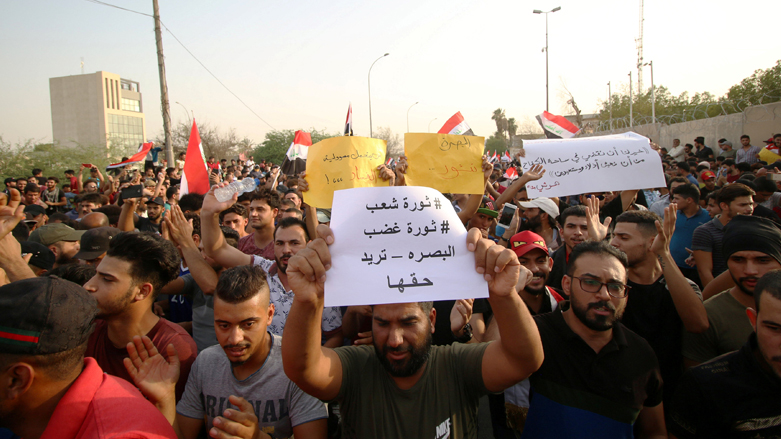Iraqi forces use tear gas, make arrests to disperse protesters in Basra

ERBIL (Kurdistan 24) – Iraqi riot police used tear gas to disperse demonstrators marching against inadequate public services and government corruption on Saturday in the southern city of Basra, security sources told local media.
The incident occurred as crowds were walking from Abdul-Karim Qassim Square in central Basra toward the al-Ashar neighborhood market, close to Shat al-Arab river, demanding improved living conditions and government services.
Witnesses told the Shafaaq news agency that security forces fired tear gas directly into groups of protesters, injuring some. They then surrounded a number of civilians in the street and launched a campaign of arrests.
Basra Operations Command justified its actions in a statement, claiming it was maintaining the “safety and stability” of the city by stopping potential “saboteurs” from "derailing" the demonstrations.
It also suggested that the protest was illegal, saying that the government requires that protestors obtain a permit that is to be approved by the office of the provincial governor and security apparatus before they can take to the street.
Organizers throughout Iraq have long charged that local officials routinely deny such permit requests, fail to respond to them, or enact intentionally confusing and arbitrary rules for obtaining them.
In deadly protests that reached a climax in September and which have returned intermittently, demonstrators burned Basra's former governorate building, as well as multiple other government buildings, party offices, and the Iranian consulate.
On June 22, hundreds of protesters gathered in front of the new governorate building, a month after they blocked the front gates of the Basra Oil Company as they chanted national songs, waved the Iraqi flag, and shouted slogans condemning political parties governing their city.
Related Article: Protests continue in Iraq's southern city of Basra
Two weeks earlier, at least four people were killed and 17 more injured during a violent, anti-corruption protest in the city of Najaf.
The protests are a returning challenge for the federal government of Iraq, this time headed by Prime Minister Adil Abdul-Mahdi, who promised to address the situation in Basra and combat rampant corruption plaguing the country.
Successive Iraqi federal governments have not been able, or willing, to meaningfully address the problem. The current administration has said it is struggling to end the mismanagement of public funds while facing strong resistance from within its own institutions.
Iraq has one of the world’s largest oil reserves and is the second-largest oil producer in the Organization of the Petroleum Exporting Countries (OPEC).
The embattled Middle Eastern nation, however, continues to rank high on Transparency International’s list for corruption, fraud, and mismanagement of state institutions, some of the most significant challenges facing the country since the fall of the former regime in 2003.
Editing by John J. Catherine
